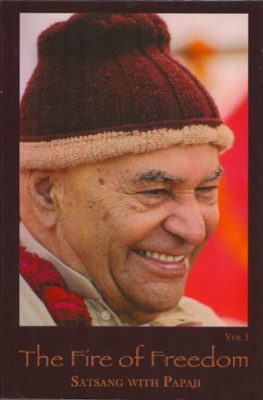 This is the first section from The Fire of Freedom, entitled ‘Who is thinking?’
This is the first section from The Fire of Freedom, entitled ‘Who is thinking?’
* * *
Question: I’m not clear how to make the best use of you as my teacher. I want to make the best use of my time here, but I’m not clear how I should use my time. What should I be doing that I am not doing at home?
Papaji: Take care of the purpose for which you have come. First, clarify your purpose. A relationship is not really necessary. That we can look after later. Purpose is the foremost, the most important thing.
When you are thirsty, you go to the river. Your purpose is to quench your thirst. It is not to ask the river what kind of relationship you have with it. You don’t need a relationship; you only need a purpose.
You came here the day before yesterday and your purpose is to find out who you are. Find this out. Know who you are. If you first know who you are, then you will automatically know who I am. So, your first priority is the question ‘Who am I?’ Once you have discovered that, you will know the real nature of all the other things and people that you see. First start with this question ‘Who am I?’ We started on this question the day before yesterday. You need to recognise yourself. Now, what was that question I asked you to ask?
Question: Who?
Papaji: Yes, what was the full question?
Question: Who is thinking?
Papaji: Yes, this was the question I gave you. I told you to find the answer to this question. I asked you to return home to the Self through asking this question, and then to come back and tell me what you saw there.
Question: What do I see there?
Papaji: Yes, what do you see there? [There was a pause while Papaji wrote ‘who’ on a piece of paper and showed it to the questioner.] What do you see here?
Question: I see a word on a piece of paper.
Papaji: This simple word is your question.
Question: What do I see in here?
Papaji: Anywhere. Wherever the ‘who’ is. Your question is, ‘Who is thinking?’
Question: I can see the question.
Papaji: Can you see where the question comes from? Focus on this question and look to see where it arises from. Return back to the ‘who’. What do you see there?
Question: I see arising. I see things arising, one from another.
Papaji: Something arose that is the predicate. Now, what is the subject? Who is thinking? Return from this predicate of thinking and focus on the ‘who’. This is the finish. Now you are at the root, aren’t you? Find out who this ‘who’ is. What is its shape? What is the shape of this ‘who’? What is its form? How is it? What does it look like? [Long pause]
What is happening?
Question: The question just arises out of nothing, out of emptiness, and disappears back into emptiness.
Papaji: That’s right. You say this question disappeared into the emptiness. The question was, ‘Who is thinking?’ For thinking you need a mind, don’t you? Now, the process of thinking has been arrested. It happened when you put the question, ‘Who is thinking?’ Now the process has been arrested. Then you said, very correctly, that the question disappears. That’s what you said. ‘There’s emptiness.’ What else do you say?
Question: It’s emptiness; just space.
Papaji: OK, it’s emptiness; it’s space. Emptiness is there; space is there. This is your inherent nature. You can call it presence or space or anything else. It is obstructed by desire and by thinking. It is always obstructed by desire. Emptiness is just the lack, the absence of thoughts and desires. When you have a burden on your shoulder, you are restless. Let us say that you are holding onto two hundred pounds and that you want to get rid of this trouble, this burden. When you drop it, you have not gained anything. You have not attained some new state that was never there before. You have simply thrown something away that was troubling you and returned to your inherent nature, the inherent state that was there before you loaded yourself up with this weight.
This thinking process, this burden, is a desire that we always carry with us. I am showing you how to drop this unwanted burden. When you ask the question, ‘Who is thinking?’ you arrest the process of thinking and return back to your true nature, your inherent nature, your spontaneous nature, the pure source that is empty. This is your own nature, and this is what you are always. The mind does not enter there. Time does not enter. Death does not enter. Fear does not enter. This is your inherent, eternal nature. If you stay there, there will be no fear. If you step out of it, you step into samsara, manifestation, and there you are in trouble all the time.